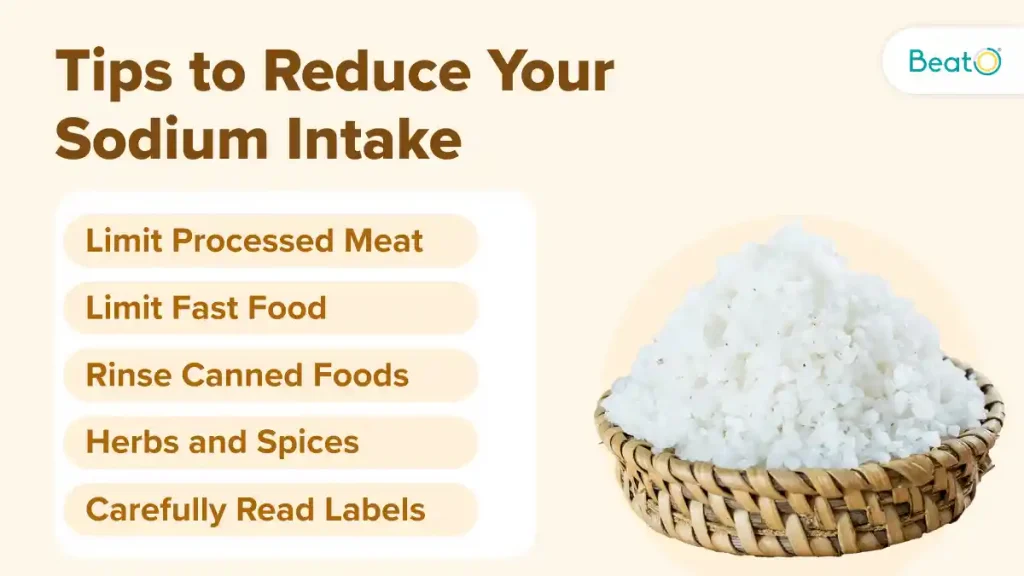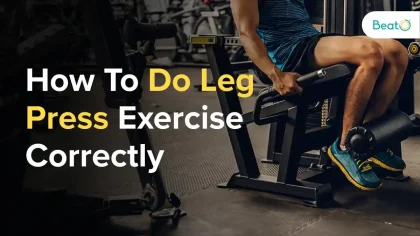The major portion of sodium in our diet gets entered through packaged and restaurant food; however, if consumed excessively, it can lead to various health issues such as high blood pressure, heart disease, and stroke. Moreover, cutting off sodium levels in your diet yields significant health benefits, including reducing the chances of high blood pressure and your risk of heart disease, stroke, and other chronic conditions. Here are some effective ways to reduce sodium intake in your diet.

Also read: Building A Stronger Core: Unlocking The Surprising Plank Exercise Benefits
Tips to Reduce Your Sodium Intake
Here are some essential tips to reduce your sodium intake in your diet to improve your heart and overall health.

Try Home Cooked Food
Home-cooked food is essential and allows you to have all the nutrients, including sodium, through the amount of salt added. By preparing your meal at home, you can use a variety of ingredients, spices, herbs, and other flavour enhancers to replace salt, thereby reducing the sodium intake without compromising taste.
Include Fresh Fruits & Vegetables
Incorporate fresh fruits and vegetables into your diet. Fresh fruits and vegetables are naturally low in sodium and high in nutrients. In addition, make it a habit to add a variety of fresh fruits and vegetables into your meals and snacks to boost your health and reduce sodium intake simultaneously.
Also read: Unlocking the Potential: Is Beaten Rice Good for Diabetes?
Choose Low-Sodium Options
Look carefully for the low sodium or sodium-free options while shopping for groceries. Avoid canned soups, broths, sauces and condiments that include sodium-rich components. Moreover, these choose options that offer optimal sodium levels, eventually offering convenience without the health risks associated with high sodium intake.
Carefully Read Labels
One of the easiest yet most powerful ways to reduce sodium intake is by reading the labels carefully. Pay attention to the sodium content listed on the packaged foods and opt for lower-sodium options whenever possible. Moreover, choosing products labelled low sodium or no added salt can significantly reduce your daily sodium intake.
Also read: 7 Common Reactions to Trauma You Must Know About
Incorporate Herbs and Spices
Herbs and spices are perfect alternatives to salt to salt for addoing flavour to your dishes. Try using spices and herbs that include basil, oregano, cilantro and spices like turmeric, cumin and paprika to make delicious and flavourful meals with excess sodium.
Limit Fast Food
You need to limit several food items, including Pizzas, momos and many more. These fast-food items are high in sodium. If you do eat out, ask for your meal to be prepared without salt and choose healthier options.
Pick Fresh or Frozen Vegetables
You can choose to eat fresh or frozen vegetables over canned ones, which often contain added salt. These little things are essential to follow to maintain overall health and lead towards a healthier life.
Rinse Canned Foods
Keep in mind to simply drain and rinse canned foods under cold water before using them in your recipes. Some canned foods such as vegetables, peas, beans and tuna must be thoroughly washed under cold water before using in your recipes. This simple step can remove a significant amount of excess sodium content.
Limit Processed Meat
Consuming processed meat can lead to conditions where blood pressure and cholesterol levels rise in the body. Moreover, it is not beneficial for your overall health, and it must be avoided, which in turn plays an important role in lowering sodium intake. Processed meats, including sausage, bacon and canned meats, are filled with high levels of sodium, which may lead to several health issues, including hypertension and other cardiovascular diseases.
Also read: Mastering Leg Press Exercises: Proper Technique & Benefits
Be Mindful of Condiments
There are some condiments that must be avoided, such as soy sauce, ketchup, mustard and salad dressings, as these are packed with a significant amount of sodium in your diet. Instead, you can opt for low-sodium condiments and make a meal at home using fresh ingredients and herbs.
Wrapping Up
So, by making these simple dietary and lifestyle changes, you can significantly reduce your sodium intake, which can eventually help lower and manage your blood pressure and heart-related issues. Moreover, reducing sodium intake is a crucial step towards improving heart and overall health. Low sodium intake can reduce the risk of chronic diseases. Plus, you must consult with a healthcare provider for personalised advice.
Disclaimer: The content of this article is compiled information from generic and public sources. It is in no way a substitute, suggestion, or advice for a qualified medical opinion. Always consult a specialist or your own doctor for more information. Beato App does not claim responsibility for this information.
Are you looking for the perfect glucometer to check your blood sugar level? Try out BeatO smartglucometerkit, affordable and easy to use.
Discover top-tier diabetes care with BeatO’s Chief Clinical Officer,Dr. Navneet Agarwal. His expertise in Diabetes ensures personalised guidance for overall health. Try out a smartglucometerand keep track of blood sugar levels now.




